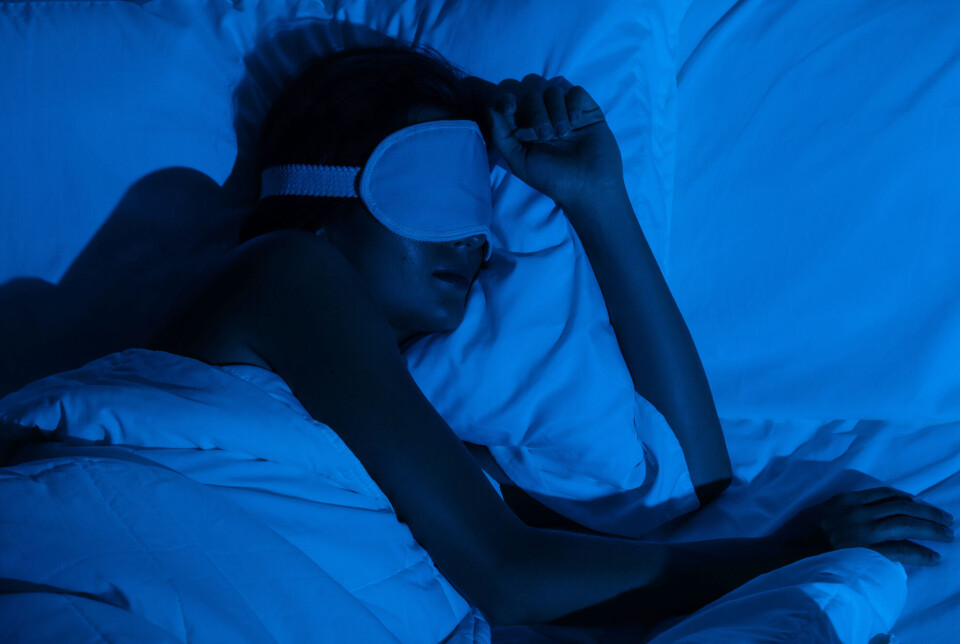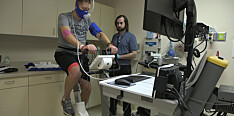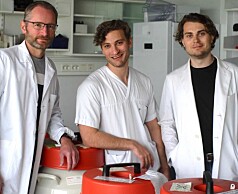
Many ME/CFS patients are severely ill and receive inadequate support
A Norwegian survey provides insight into the everyday life of a patient group we know little about.
Most people who develop ME, or chronic fatigue syndrome, experience a moderate or mild form of the disease. But some patients become very ill.
People with severe or very severe ME are barely able to leave their bed and are completely dependent on help for most everyday tasks.
Little research has been done on this group. But a Norwegian survey of the most severe ME sufferers sheds a little more light on the matter.
Severely impacted
The results show that the survey participants had extensive, long-lasting and extremely disabling symptoms. The disease basically puts an end to all forms of normal life activities.
The survey responses “clearly show that many patients are severely impacted. They have low quality of life and great care needs,” says Ingrid B. Helland from the Norwegian National Advisory Unit on CFS/ME. She did not work on the survey herself.
“At the same time,” Helland says, “the results also show – as the report states in the conclusion – that it would be possible to give help and support to many more patients than are currently receiving help. It’s very important for this to be made clear.”
Helland is a doctor at Rikshospitalet in Oslo and head of the Norwegian National Advisory Unit on ME/CFS.
Figures from user survey
The data in the article, recently published in the Journal of Clinical Medicine, is not really new. They come from a user survey carried out in 2018 by the Norwegian ME Association, an interest organization for ME patients.
The association posted invitations on its website and in various forums on social media, where they encouraged people with an ME diagnosis and serious illness to respond. Relatives could also answer if the ME patient was too ill to do it themselves.
Some of the questions were about patients' functioning in everyday life, such as how often they were able to say a few words, turn over in bed, feed themselves, shower or have visitors.
Other questions were about patients’ experience with the healthcare system and other support systems that are supposed to help sick patients.
The researchers used the answers from the questionnaire to assess how serious the participants' illness was.
The severe ME category included 444 participants, while 47 had very severe ME. In addition, 95 responses were received from ME sufferers who ended up in the moderate ME category. These patients were included as a reference group.
Many reported that their condition worsened
The survey results paint a rather bleak picture.
Many of the most seriously ill patients had developed ME/CFS before they turned 15, and many in both groups had been ill for a long time. The majority answered that the illness varied over time or became progressively worse. None of the very severely ill patients, and only a small percent of the severely ill, responded that their condition improved.
However, the survey cannot make conclusions about patients’ chance of improvement or full recovery. For example, it does not pick out ME patients who previously had severe ME but have now improved.
The data comes from an open user survey and therefore cannot provide us with any general information about how many people suffer from severe ME in Norway. Nor do the data tell us anything about whether the results are representative of all patients with severe ME.
The Norwegian ME Association also used a new questionnaire and measurement tool to assess the patients. This makes it difficult to compare these results with other studies of ME patients.
The data nevertheless provide important insight into the life situation of patients who responded to the survey.
Only able to turn over in bed once a month
The severe ME sufferers in the survey responded that they had disabling symptoms.
Fifteen of the very severe ME sufferers could not eat, but received nutrition via a tube or intravenously.
On average, the very seriously ill patients stated that they could sit up in bed only once or twice a year. They were only able to turn themselves over in bed between once a week and once every two months.
Activities that they could do somewhat less often included having a conversation lasting more than five minutes and using a toilet.
Low tolerance for sensory impressions
Many patients with severe ME also had eating problems, such as nausea, stomach pain and difficulty swallowing food. They could often eat without help and get to the toilet. But they could only tolerate having visitors a few times a year. The same applied to leaving the house.
Both groups reported low tolerance for sounds, smells and light. The very severely ill reacted the most to such sensory impressions.
The most troublesome symptoms varied greatly. Overall, most patients reported that they had the biggest problems with exhaustion. Many also reported muscle and joint pain, cognitive problems, sleep disturbances and hypersensitivity to sensory impressions as particularly troublesome.
Relatives spend 40 hours a week on care
The experience of many patients was that they did not get the help they needed from the health and social care systems. More than two out of three of patients with severe and very severe ME/CFS felt that they did not receive adequate health care. Many experienced that healthcare professionals did not believe their symptoms.
“The sickest ME patients are extremely ill, with a severe symptom burden and very low functional capacity, but they and their relatives are often completely without appropriate help,” says Trude Schei, secretary general of the Norwegian ME Association.
Schei has ME herself and is one of the authors behind the recently published article. The other two authors are Professor Emeritus Kristian Sommerfelt at the University of Bergen and Arild Angelsen, Professor of Social Economics at NMBU. Angelsen is also a board member of the ME Association.
“Many sick patients are cared for by relatives, who experience a great strain on their own health and finances,” writes Schei.
In the group of severe ME/CFS patients, all but one of the relatives stated that the patient needed round-the-clock care.
Most relatives in both groups answered that they spent more than 40 hours a week on patient care and that this greatly affected their own work, finances and social situation.
Many patients do not feel believed
Helland confirms that patients might be met by a healthcare system that does not understand their needs and rejects them.
“I think the patients are right in saying that they’re often not taken seriously,” she says.
“There’s still a lot of ignorance out there. The healthcare service is not adapted to patients in this group.”
Home nurses for instance, go on rotations where many employees are involved in the care of a patient. Not all of these carers have enough knowledge about ME/CFS and about the needs of individual patients.
If the patients have a very low tolerance for sensory input and activity to begin with, the carers who are supposed to help may easily end up making the patient worse. This can in turn lead to patients and relatives being reluctant to ask for help again, Helland believes.
Good help from GP and occupational therapist
Although no treatment is available to cure ME/CFS, several types of treatment and aids can be used to relieve symptoms and make daily life easier for patients.
Most ME sufferers felt that they received good help from their GP and occupational therapist. Occupational therapists work to facilitate the patient's ability to cope with everyday situations. They map the factors that hinder and promote various activities and can suggest technical aids.
Fewer patients had positive experiences with home nurses and hospital doctors. For some services, up to 30 per cent reported a deterioration, while only a few said this was the case for other services.
The largest proportion of patients with very severe ME/CFS, about 30 per cent, felt home care made them worse. For patients with severe ME/CFS, the largest proportion – around 40 per cent – felt school made them worse.
“We’re observing that the actors in the healthcare system who see and follow up ill patients over time and gain an understanding of the disease, like GPs, physiotherapists and occupational therapists, often provide effective support,” Schei writes.
Possible to create good arrangements
The results indicate that the healthcare services offered to the participants in the survey were not sufficient. But they also suggest that there are good ways to improve the situation.
“It’s possible to create good arrangements and security for ill patients, but it will require municipalities and the healthcare system to be willing to listen and think in new ways,” writes Schei.
She believes it is important to listen to the patients, when they are able to speak, and to their relatives.
The Norwegian ME Association, which is behind the study, wants ME patients to have fewer and more regular helpers with knowledge of the disease, but also for public nursing home options to be created for the most severely ill.
“Sick patients need peace and the security of having carers who know how vulnerable the sick person is,” says Scheie.
Trust is important
Helland is thinking along the same lines.
“We need teams with not too many people. It’s important for the patients and/or relatives to have at least one person in the support system that they trust – someone who can follow the patient over time and tailor the options for this particular person.”
Helland believes part of the problem is that the support system is used to handling patient groups that recover more quickly. So what happens when time passes and the patient doesn’t recover?
“The occupational therapists get good scores in the survey, and I think we need a lot more of them to work with this patient group. But in practice I often see that their services are taken away after a certain amount of time when the patient hasn’t improved significantly. It’s really unfortunate,” says Helland.
“I also think that some people in the healthcare system get discouraged. So the teams around the patient have to be given help and support to cope with the situation, too.”
Reference:
Kristian Sommerfelt, Trude Schei mfl.: Severe and Very Severe Myalgic Encephalopathy/Chronic Fatigue Syndrome ME/CFS in Norway: Symptom Burden and Access to Care. Journal of Clinical Medicine, 2023.
———
Read the Norwegian version of this article at forskning.no






































